
The "Important Matters Explanation" might seem like just another document to sign on the contract day. The language used, like "Party A" and "Party B," can be highly technical and confusing, causing your brain to start rejecting the information. However, this explanation is a crucial part of the pre-contract review process. Here, we've summarized 10 key points to pay special attention to.
If you want a quick overview, you can skip to section 3: "10 Key Points to Watch Out for During Important Matters Explanation." For a detailed understanding, refer to sections 1 and 2, which cover "What is the Important Matters Explanation?" and the main items of the explanation document.
Although the Important Matters Explanation document is a complex and technical document that real estate agents are required to explain, knowing what is written and where can significantly improve your understanding. Be sure to read this article to prepare before you receive the actual explanation.
The Important Matters Explanation is a mandatory process where the real estate company explains the details of the contract to the tenant "before the contract is signed." Once you have applied for a property and passed the tenant screening, it's time to proceed to the contract. The explanation typically happens right before the contract is signed and serves as a final review. Signing the Important Matters Explanation document does not mean the contract is finalized.
When searching for a property, you gather information from online listings, floor plans, and on-site visits. The purpose of the Important Matters Explanation is to confirm that there are no discrepancies between this information and the actual contract details, as well as to provide any additional information needed to make an informed decision about whether to proceed with the contract.
Although this explanation usually occurs on the contract day just before signing, you can request to have the documents sent to you in advance, giving you more time to review and make a thoughtful decision.
The Important Matters Explanation consists of three main parts:
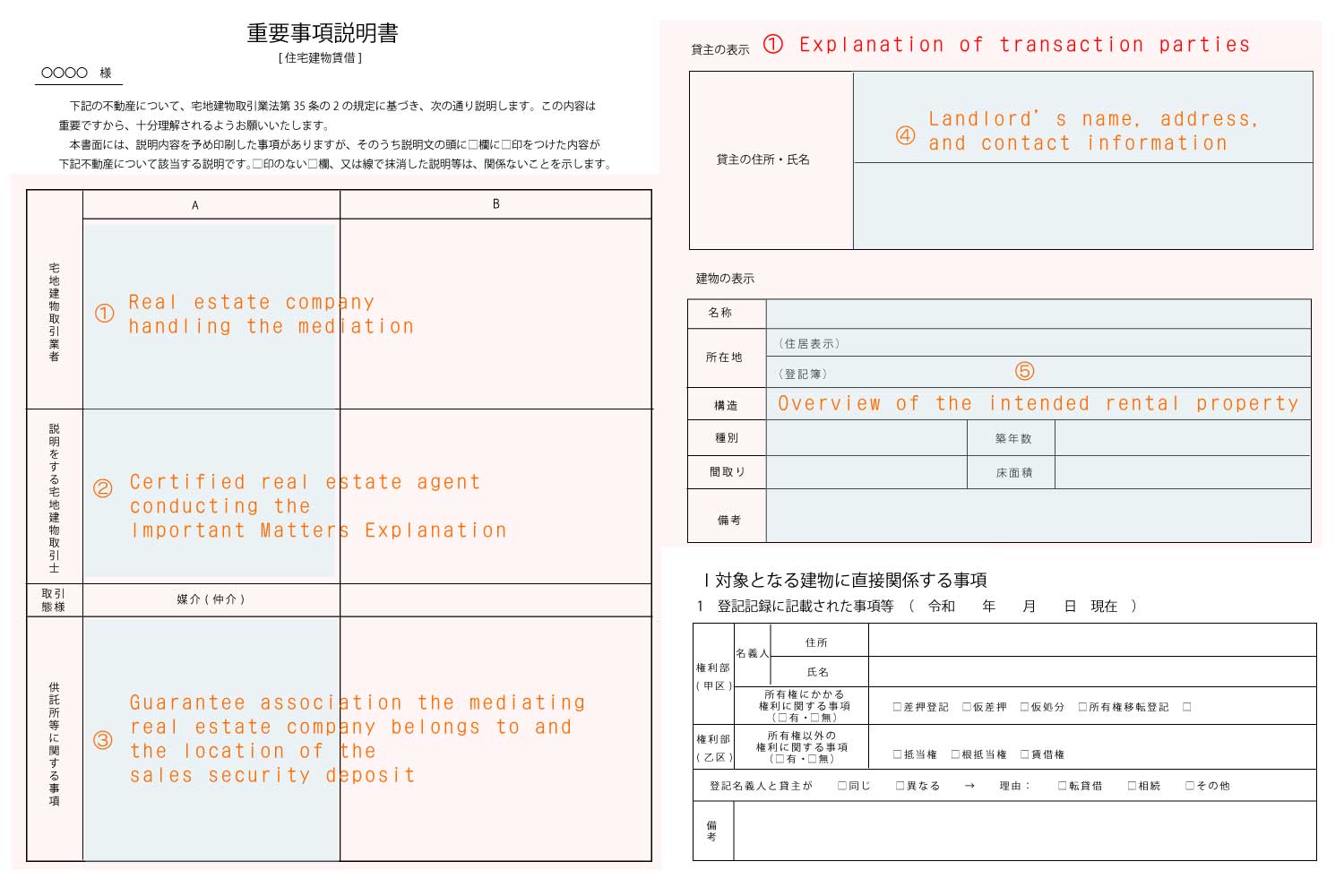
This section explains the real estate company (broker), the landlord, and the details of the property (such as an overview of the building).
1.Information about the real estate company, including its name, address, representative, and real estate license number.
2.Information about the certified real estate agent conducting the explanation, including their name, registered office, and license number.
3.Details about the security deposit (guarantee deposit) and where it is held.
4.Information about the landlord, including their name, address, and contact details.
5.Basic information about the property, such as its name, unit number, structure, age, layout, and floor area.
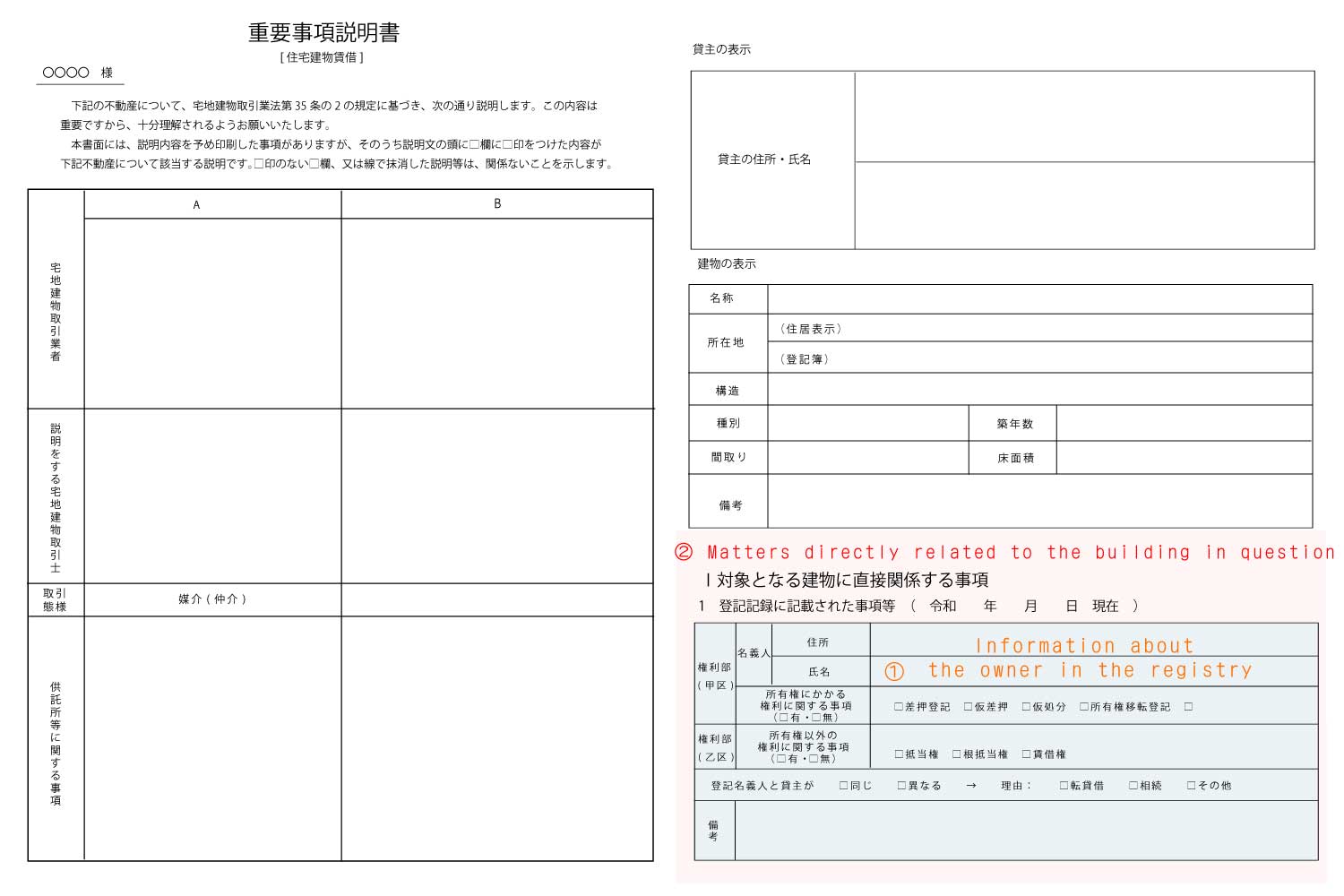
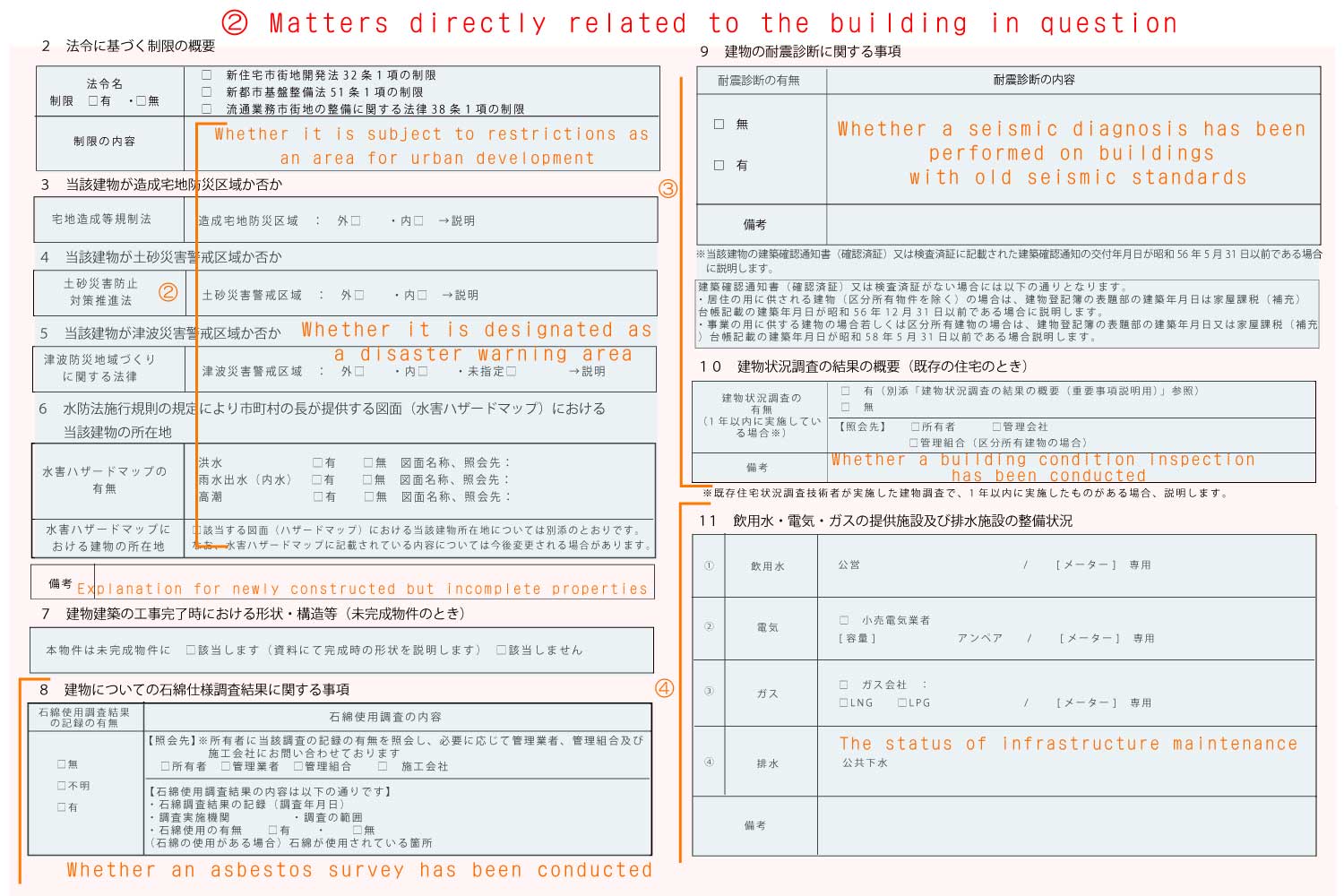
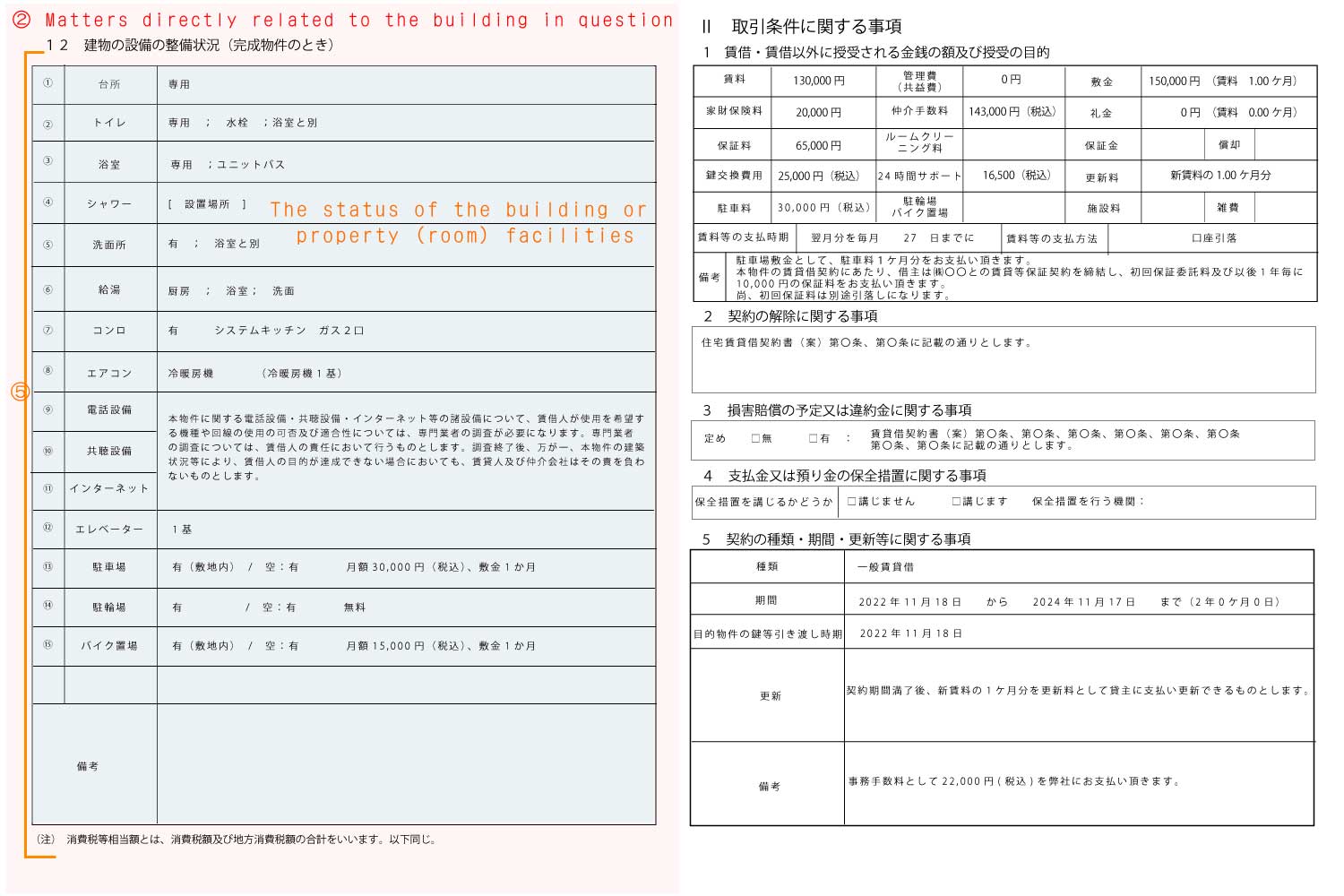
1.Property Ownership:
Verify if the landlord and the owner are the same person. If not, clarify their relationship. This could happen if the owner is an individual and the landlord is a company they run, or if the registration hasn’t been updated post-inheritance, or if a real estate company is subletting the property. Also, check if the property is under any foreclosure.
2.Hazard Zones:
Check if the property is located in a disaster-prone area such as a landslide, flood, or tsunami zone. Since August 2020, it is mandatory to explain the flood hazard map status.
3.Structural Assessments:
Confirm if the property has undergone earthquake resistance testing, asbestos inspection, or building condition surveys. While these checks are not compulsory for all buildings, any performed assessments should be documented. Building condition surveys are more common in property sales than rentals.
4.Utilities:
Verify the status of essential utilities like electricity, gas, and water (sewage). Check if the meters are individual or shared. In older properties with shared meters, tenants may pay a fixed amount for utilities directly to the landlord.
5.Building Facilities:
Details about the installation status of essential facilities like toilets, bathrooms, and kitchens. Information about air conditioning, TV, phone, and internet services, including any limitations on preferred internet providers. Also, check the availability and costs of parking, bicycle, and motorcycle storage.
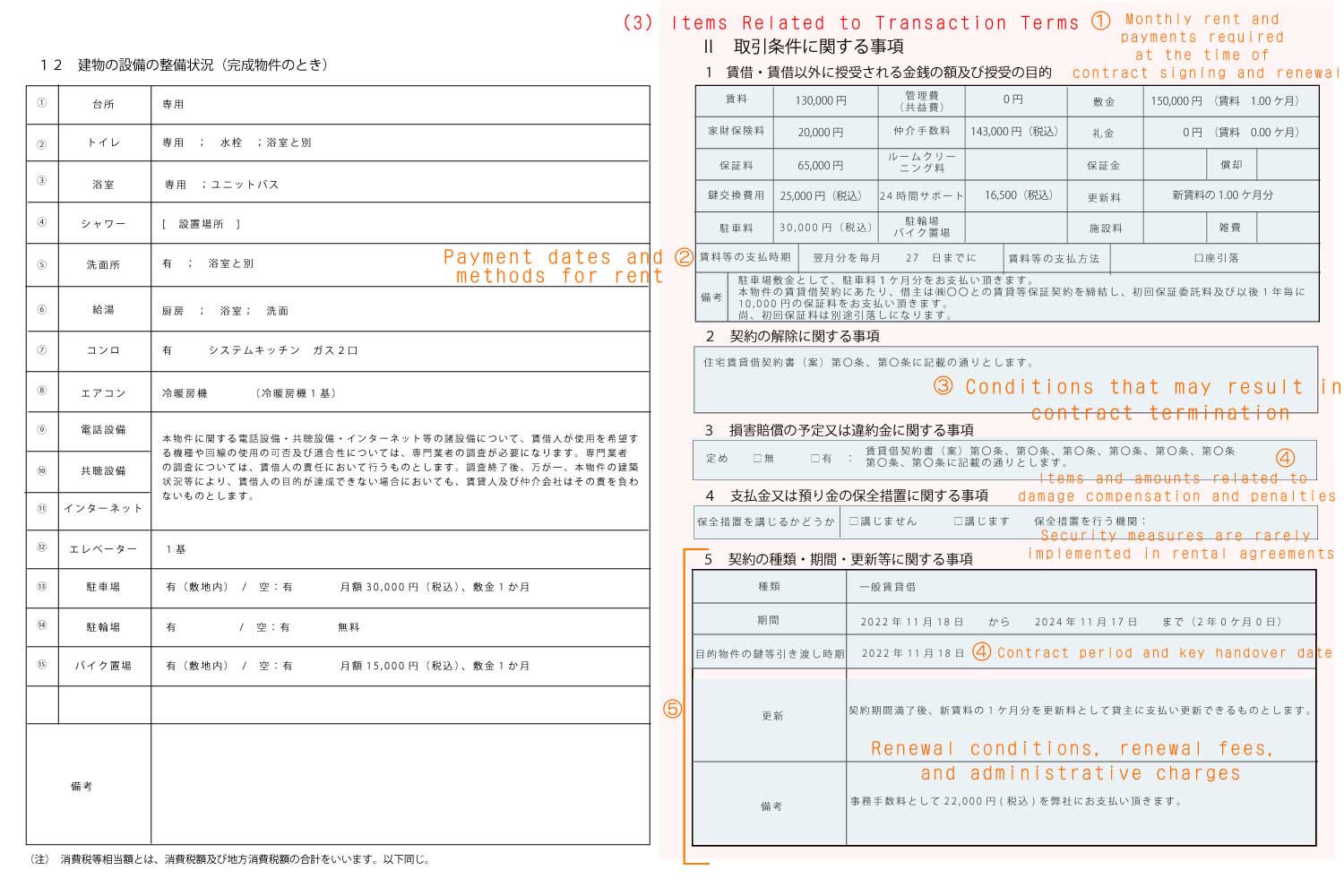
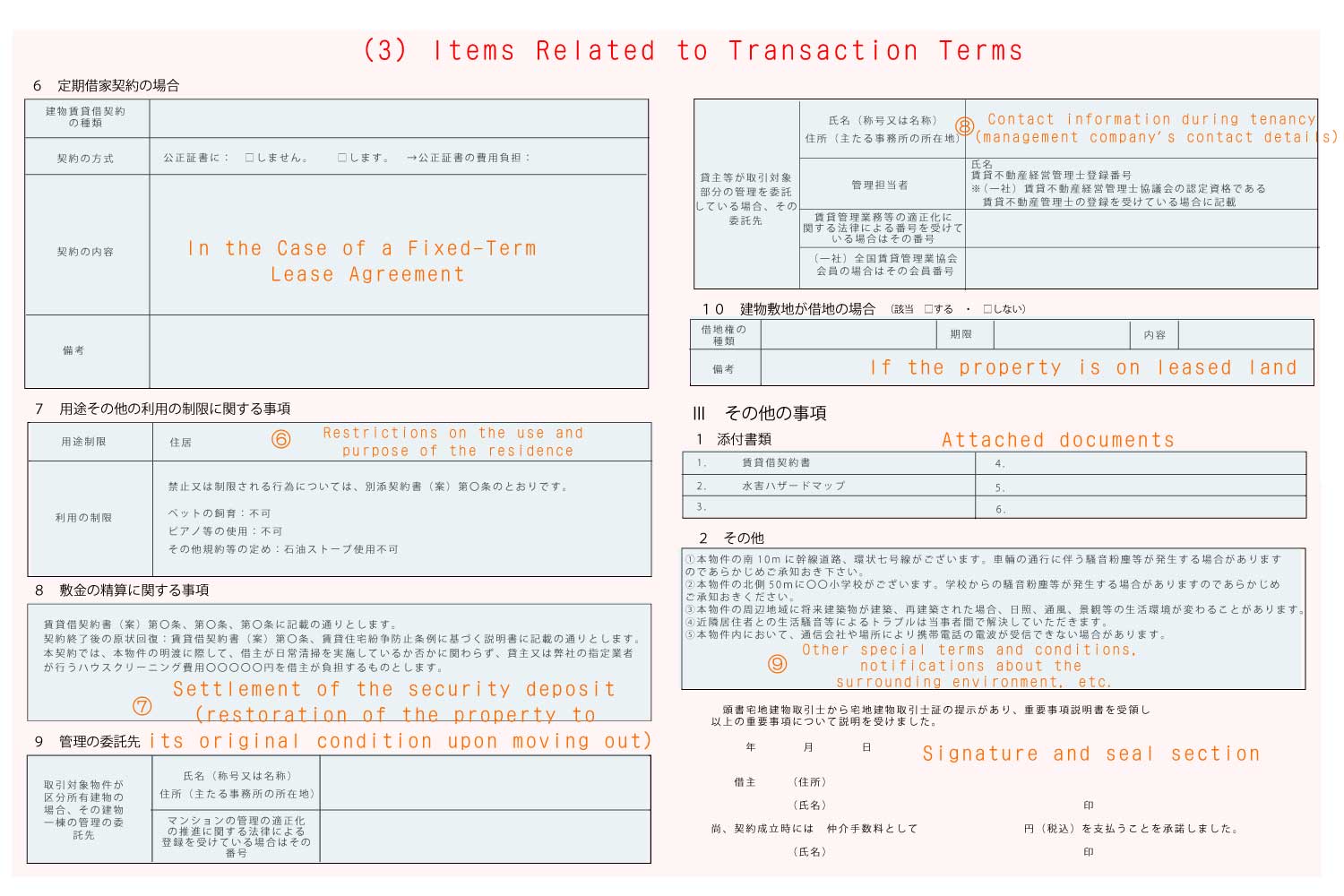
1.Rent and Additional Fees:
Confirm the monthly rent, management fees, and initial costs. If you need to join a guarantee company, check its fees and any renewal fees.
2.Payment Terms:
Understand the payment deadline and method for the monthly rent. If it’s through bank transfer, ensure you don’t miss payments to avoid penalties.
3.Contract Termination:
Review the conditions under which the contract can be terminated due to violations.
4.Damages and Penalties:
Understand the penalties for late rent payments, staying beyond the lease end date, or causing damage to the property through negligence or intentional actions.
5.Contract Duration and Renewal:
Check the contract period and renewal fees. Also, verify any administrative fees payable to the real estate company during renewal.
6.Property Restrictions:
Confirm if pets are allowed, including the types and number of pets. Also, check if musical instruments are permitted and any other restrictions.
7.Security Deposit Settlement:
The security deposit covers unpaid rent or repair costs when you move out. Understand the terms for settling this deposit. If the contract mentions non-refundable deposits, be aware of this.
8.Property Management:
If the landlord has delegated property management, find out which company handles it.
9.Special Conditions:
Review any additional notes or special terms related to the surrounding environment or the property itself.
Now, let’s explain the ten key points to pay attention to in the Important Matters Explanation!
The Important Matters Explanation must be conducted by a certified real estate agent. Ensure that the agent presenting the explanation shows their real estate transaction certificate and that their name and seal are on the Important Matters Explanation document. It’s dangerous if this requirement is not met, as it violates the Real Estate Brokerage Act.
City gas and propane gas costs can vary significantly depending on the region, with propane gas generally being 1.5 to 2 times more expensive in the Tokyo metropolitan area. Check whether it’s listed as city gas (LN gas, LNG) or propane gas (LP gas, LPG).
Fixtures left by previous tenants are considered leftover items, which new tenants can use freely under some agreements. Be cautious as the cost of removing these items might fall on the tenant. In one-room or one-bedroom apartments, air conditioners are often fixtures, but in larger properties with multiple rooms, only one air conditioner might be considered a fixture. Since leftover items are not considered fixtures, the landlord has no obligation to repair them if they break down due to age. Similarly, if a property is listed as having a "gas stove installable," it might mean that a gas stove left behind can be used but is not a fixture. If unwanted, discuss possible removal.
Knowing the renewal costs is crucial. Typically, renewal fees amount to one month’s rent. Additionally, check for administrative fees payable to the real estate company and the renewal fee for any guarantee company you joined. Fire insurance usually aligns with the rental contract period and needs to be renewed every two years.
Since August 2020, it has been mandatory to include flood hazard map information in the Important Matters Explanation. Check this carefully, especially if the property is near the sea or rivers. Also, be mindful of greenways that might be built over former rivers.
For properties with no security deposit or key money (zero-zero properties) or those offering free rent at move-in, there might be penalties for early termination within the first year. Typically, the penalty is one month’s rent. If there’s a penalty for termination within two years or if the penalty is more than two months’ rent, be aware of the potential high costs at move-out. For more details, refer to related articles about the drawbacks of no-deposit properties.
Disclosures must be made about any suicides or accidental deaths that occurred. Also, check for any negative factors like unpleasant odors, noise, construction sites, or cemeteries nearby. Confirm these during the property viewing as well. Refer to related articles for detailed guidance on checking the surrounding environment.
Tenants must restore the property to its original state upon move-out. The Ministry of Land, Infrastructure, Transport and Tourism’s guidelines state that tenants are responsible for damages due to intentional acts or negligence, while normal wear and tear or aging are the landlord's responsibility. Be cautious of agreements that deviate from these guidelines, making tenants responsible for natural wear or all equipment failures. For detailed advice, read related articles on restoration costs.
Understand the rules about keeping pets and playing musical instruments. Violating these terms could result in a breach of contract. Don’t assume it’s okay to keep a silent pet or play a silent instrument. Check in advance if you plan to have pets like goldfish or use musical equipment like synthesizers. For more information, see related articles about pet ownership in rental properties.
Verify the contact details for emergencies or maintenance issues. If the property is managed by a company, you can contact them for issues. If the landlord manages it personally, you’ll need to contact them directly, which can be intimidating. This is an important detail, so make sure you have this information.
These are the key points to pay attention to in the Important Matters Explanation. Although this information may not seem very engaging, many potential issues are covered in this document. Reading this article before your Important Matters Explanation will help you understand the content more easily.
Use this opportunity to clarify any doubts or concerns, and proceed with the contract only after you are fully satisfied. Thank you for reading to the end.

